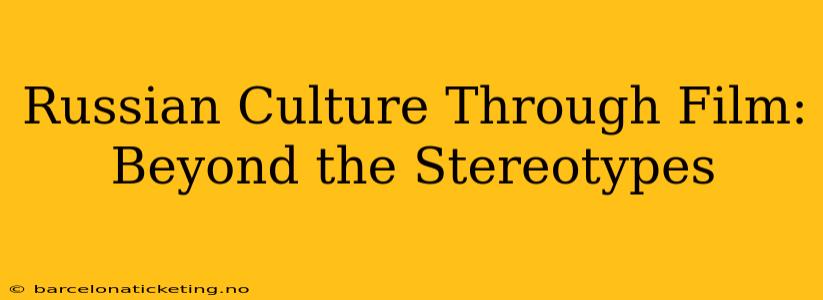Russian cinema, often shrouded in Cold War narratives and stereotypical portrayals, offers a far richer and more complex tapestry of cultural expression than commonly perceived. By exploring diverse genres and eras, we can uncover a nuanced understanding of Russian society, history, and the human spirit. This exploration goes beyond the vodka-soaked, fur-hatted clichés to reveal the vibrant soul of a nation.
What are some common stereotypes about Russian culture in film?
Common stereotypes often depict Russians as stern, brooding, vodka-loving individuals, inhabiting bleak landscapes and entangled in political intrigue. These portrayals, while sometimes present in Russian cinema itself, represent a limited and often inaccurate view. Many films perpetuate the image of the stoic, emotionally repressed Russian, overlooking the wide spectrum of personalities and experiences within the country. The focus on grim realities also overshadows the rich artistic traditions, vibrant social life, and complex emotional landscapes of Russian society.
How do Russian films challenge these stereotypes?
Progressive filmmakers actively challenge these oversimplifications. Films like "Leviathan" (2014) explore corruption and social injustice, but do so through deeply human stories, showcasing the resilience and emotional depth of ordinary people. Similarly, films like "Burnt by the Sun" (1994) depict the complexities of human relationships during Stalin's era, showcasing both the cruelty and the profound emotional connections within the context of political turmoil. These films force viewers to confront the multifaceted reality of Russian life, moving beyond simple good versus evil narratives.
What are some essential Russian films to understand the culture?
To truly appreciate the breadth and depth of Russian culture through film, one needs to explore diverse periods and styles. Consider these essential works:
-
Soviet-era classics: Films like Sergei Eisenstein's "Battleship Potemkin" (1925) offer a glimpse into the revolutionary fervor and artistic experimentation of the early Soviet period. While propagandistic in nature, they reveal much about the ideology and social aspirations of the time.
-
Post-Soviet cinema: Films from the post-Soviet era, like "Brother" (1997) and its sequel, provide insights into the social and economic upheaval following the collapse of the Soviet Union. These films expose the disillusionment and struggles faced by ordinary citizens in a rapidly changing world.
-
Contemporary Russian cinema: Modern Russian cinema offers a diverse range of perspectives, from the socially conscious works of Andrey Zvyagintsev to the more commercially successful films exploring themes of love, loss, and identity.
What themes are frequently explored in Russian cinema?
Several recurring themes dominate Russian cinema:
-
The struggle against oppression: This theme, deeply rooted in Russian history, is evident in films depicting the struggles against totalitarian regimes, social injustice, and the ongoing fight for individual freedom.
-
The search for meaning and purpose: Many Russian films explore existential themes, grappling with the complexities of human existence and the search for meaning in a world often marked by hardship and uncertainty.
-
The importance of family and community: Despite the hardships depicted in many films, the importance of family and community bonds often emerges as a powerful source of strength and resilience.
-
The beauty and harshness of the Russian landscape: The vast and often unforgiving landscapes of Russia frequently serve as a backdrop, reflecting the resilience and adaptability of the Russian people.
Are there any documentaries that provide insight into Russian culture?
Yes, several documentaries offer insightful perspectives on Russian culture. These films often explore specific aspects of society, such as art, music, history, or social issues. Seeking out documentaries focused on particular eras or cultural movements can offer a deeper understanding of specific facets of Russian life that may not be fully represented in narrative films.
How can I further explore Russian culture beyond film?
Exploring Russian culture beyond film involves delving into its rich literary heritage, its diverse musical traditions, and its visual arts. Reading classic Russian literature, listening to Russian music, and exploring Russian art museums and galleries can provide a more comprehensive understanding of this complex and fascinating culture.
By exploring Russian cinema critically and thoughtfully, we move beyond simplistic stereotypes and discover a diverse and nuanced cultural landscape. The films discussed here provide only a starting point for a journey into the heart of Russian culture—a journey that promises to be both challenging and deeply rewarding.

